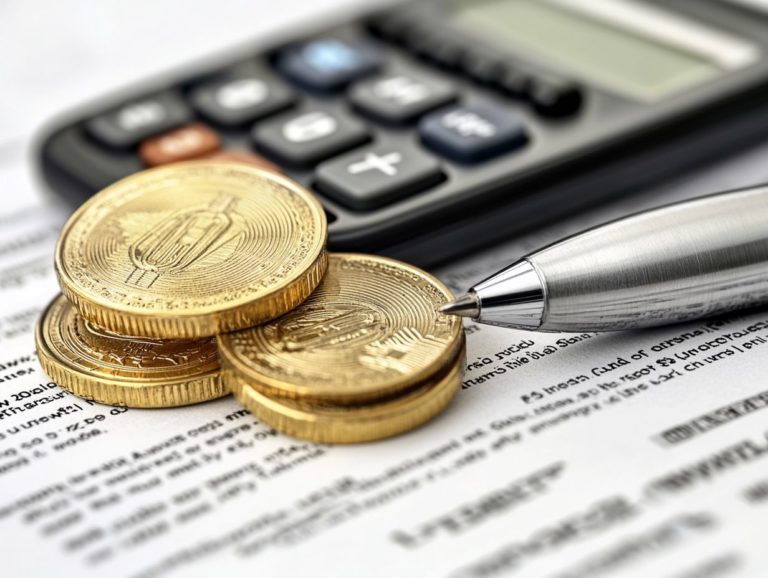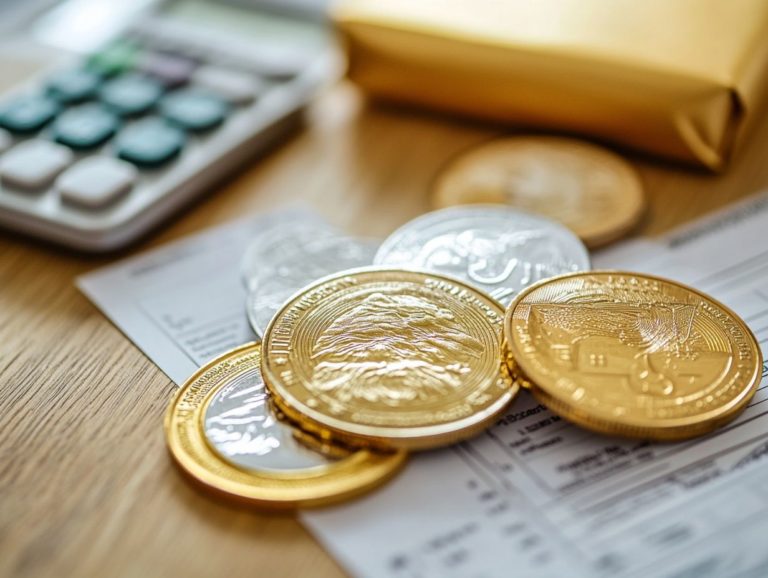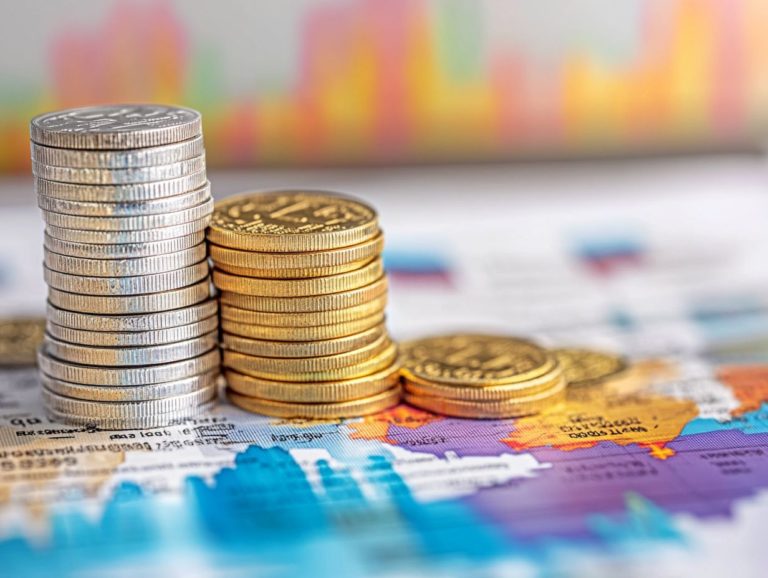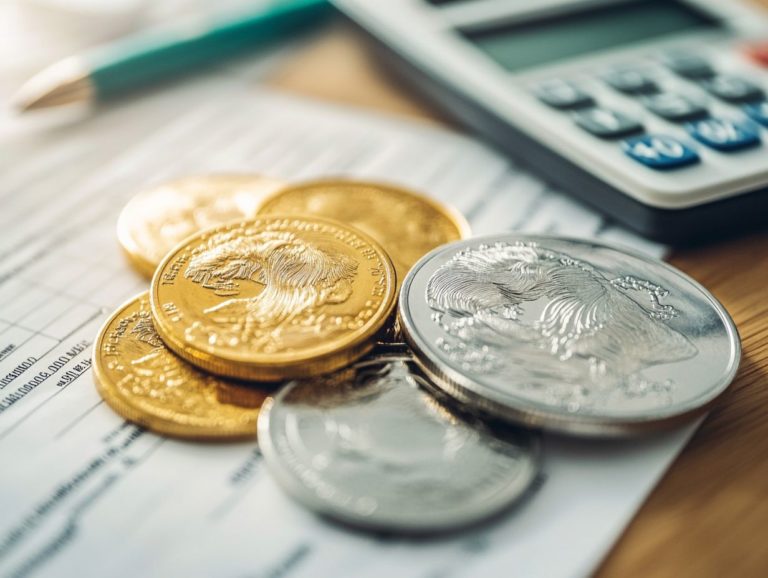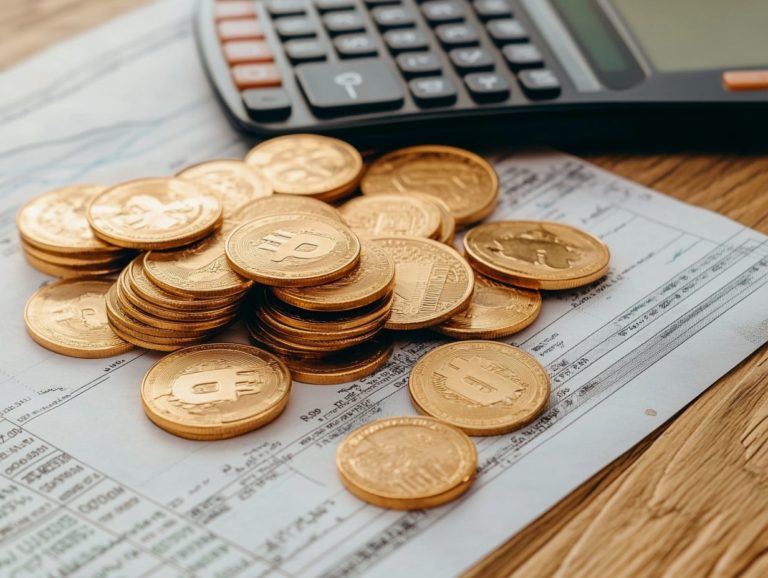Tax Implications of Precious Metals in Business Ventures
Navigating the realm of precious metals in business is both intriguing and complex. As you explore investment opportunities in gold, silver, and other valuable commodities, it s essential to understand the tax implications tied to these assets.
This article delves into the various income and capital gains tax considerations you need to keep in mind. We ll highlight essential reporting requirements along the way. It also presents effective tax planning strategies designed to minimize your liability.
You ll encounter common pitfalls and mistakes to avoid, ensuring you re well-equipped to make informed decisions.
Dive in to uncover how precious metals can significantly influence your business ventures!
Contents
- Key Takeaways:
- Precious Metals in Business Ventures
- Tax Implications of Using Precious Metals in Business
- Reporting Requirements
- Using Precious Metals for Tax Planning
- Strategies for Reducing Tax Liability
- Potential Risks and Pitfalls
- Common Mistakes and How to Avoid Them
- Summary of Key Points
- Frequently Asked Questions
- What are the tax implications of using precious metals in business ventures?
- Are there any tax benefits to using precious metals in business ventures?
- Do I need to pay taxes on the purchase of precious metals for my business?
- How are taxes calculated when selling precious metals as part of a business venture?
- Can I use precious metals as a form of tax-free investment in my business?
- Do I need to report my precious metals holdings on my business tax return?
Key Takeaways:
- Including precious metals in business ventures can have tax implications that must be carefully considered.
- Income and capital gains taxes may apply to the use of precious metals, and specific reporting requirements must be followed.
- Strategic use of precious metals can be a valuable tool for tax planning. Avoid common mistakes and understand potential risks.
Precious Metals in Business Ventures
Precious metals think gold, silver, and platinum have long been esteemed as essential assets in the realm of business ventures. They offer distinct advantages that can elevate your investment strategies.
These metals act as a reliable hedge against economic fluctuations while opening doors for capital growth and diversification within your investment portfolio.
As you navigate your financial journey, consider how businesses increasingly value precious metals as powerful instruments for financial growth.
This recognition keeps them integral to both investment and financial planning, providing a safeguard for your capital in the face of market volatility.
Tax Implications of Using Precious Metals in Business
Know the tax implications of using precious metals in your business! Understanding these aspects is essential for any entrepreneur seeking to comply with IRS regulations while optimizing tax planning.
The nuances of income tax and tax on profits from selling assets can profoundly impact your overall profitability. This varies significantly depending on whether gains are short-term or long-term.
Working with a tax professional empowers you to make informed decisions about strategically utilizing precious metals in your investment portfolio. This ensures accurate reporting and minimizes tax liabilities.
Income Tax Considerations
When you incorporate precious metals into your business venture, grasping the income tax considerations is crucial for effective tax planning and compliance with IRS regulations.
This means recognizing that earnings from the sale of these metals be it gold, silver, or platinum are subject to various tax implications.
Understand how your profits are categorized, as this directly influences your taxable income. Misunderstanding these obligations can lead to costly mistakes or penalties. Consulting a tax professional can be invaluable in this intricate landscape.
These experts can clarify the complexities of the tax code, ensuring you meet all compliance requirements while minimizing your tax liabilities in the world of precious metals trading.
Capital Gains Tax
Capital gains tax is a crucial factor when investing in precious metals. This tax varies depending on whether your gains are categorized as long-term or short-term.
This classification significantly impacts your overall tax savings. Short-term capital gains, applicable to assets held for a year or less, are taxed at your ordinary income tax rate often much higher than the rates for long-term gains.
On the flip side, long-term gains enjoy lower rates, creating a more favorable financial landscape for those who choose to hold their precious metals investments over time.
If you’re looking to maximize your returns, employing strategies like tax-loss harvesting or utilizing retirement accounts can help minimize your tax liabilities while staying within IRS guidelines.
Don t miss out on crucial strategies that can save you money! At the end of the day, consult a tax professional or explore investment opportunities in precious metals to ensure you make the most informed choices.
Reporting Requirements
The reporting requirements for precious metals investments are essential for maintaining compliance with IRS regulations. You need to ensure accurate documentation and use specific forms like Form 1099-B and Form 8949.
These forms report any gains or losses from the sale of these assets, ensuring you meet your tax obligations. Proper record-keeping streamlines this process and protects you during an audit by providing a clear account of your transactions.
Working with a tax professional offers invaluable insights, helping you navigate the complexities of tax laws related to precious metals. This proactive approach keeps you informed about regulatory changes and gives you peace of mind regarding your compliance.
Using Precious Metals for Tax Planning
Using precious metals for tax planning presents a distinctive opportunity to craft a tax-efficient investment strategy. This approach maximizes tax benefits and savings while managing your tax obligations with precision.
Strategies for Reducing Tax Liability
Implementing strategies to reduce tax liability when investing in precious metals can unlock significant tax benefits and enhance your portfolio’s efficiency.
By selecting tax-efficient investment methods such as holding assets in accounts that let you delay paying taxes or taking advantage of specific tax breaks, you can manage your overall tax burden effectively. Understanding how to leverage capital gains tax rates can lead to substantial savings.
Collaborating with a knowledgeable tax professional who specializes in investment strategies is crucial, as they can craft tailored approaches suited to your unique financial situation and adapt them to evolving tax laws.
This strategic partnership ensures your investments flourish while minimizing tax impact.
Potential Risks and Pitfalls
Investing in precious metals offers many financial opportunities. Stay alert to potential risks and pitfalls to protect your investments! If not managed carefully, these can lead to tax evasion and compliance issues that you want to avoid.
Common Mistakes and How to Avoid Them
Investors frequently encounter common missteps when investing in precious metals, resulting in significant compliance issues and unmet tax obligations.
These pitfalls often stem from a misunderstanding of IRS regulations or failing to maintain accurate transaction records. Many individuals underestimate the importance of proper documentation, which is crucial for reporting gains and substantiating deductions.
Consulting with a tax professional can enhance your understanding of the complex tax landscape surrounding precious metal investments. This expertise can illuminate beneficial tax strategies, including the tax implications of selling precious metals to a dealer, ensuring compliance while maximizing your returns.
Summary of Key Points
Understanding the key points surrounding the tax implications of investing in precious metals is crucial for crafting a robust investment strategy. It’s not just about knowing the different tax rates that apply to various metals like gold, silver, or platinum but also comprehending how these tax liabilities influence your overall returns.
Explore strategies to minimize taxes, such as holding metals in tax-advantaged accounts or differentiating between long-term capital gains and short-term gains. Consider potential risks, like market volatility or shifts in tax legislation, when shaping your investment approach.
By addressing these aspects, you can navigate the complexities of the market more effectively, positioning yourself for a successful investment journey in precious metals.
Frequently Asked Questions
What are the tax implications of using precious metals in business ventures?
The use of precious metals in business ventures can have various tax implications based on your situation. This may include taxes on the sale or purchase of precious metals, taxes on income from holding or trading precious metals, and taxes on any gains or losses from these activities.
For personalized guidance, consult a tax professional to explore investment opportunities in precious metals.
Are there any tax benefits to using precious metals in business ventures?
Yes, using precious metals in business can offer tax benefits! Businesses might claim deductions for purchasing or storing them.
Do I need to pay taxes on the purchase of precious metals for my business?
You typically need to pay sales tax when buying precious metals for business. Consult a tax professional to check for any potential exemptions.
How are taxes calculated when selling precious metals as part of a business venture?
When selling precious metals, taxes depend on the gain or loss from the sale. Subtract your purchase price and expenses from the sale price to find your gain or loss.
Can I use precious metals as a form of tax-free investment in my business?
Yes, gold and silver can be tax-free investments for businesses! Any gains from selling these metals may not face capital gains tax.
Do I need to report my precious metals holdings on my business tax return?
Most businesses don t need to report precious metals on tax returns. If you sell them for business, you must report any gains or losses. Always consult a tax expert for tailored advice.
For specific questions, always seek advice from a tax professional!










